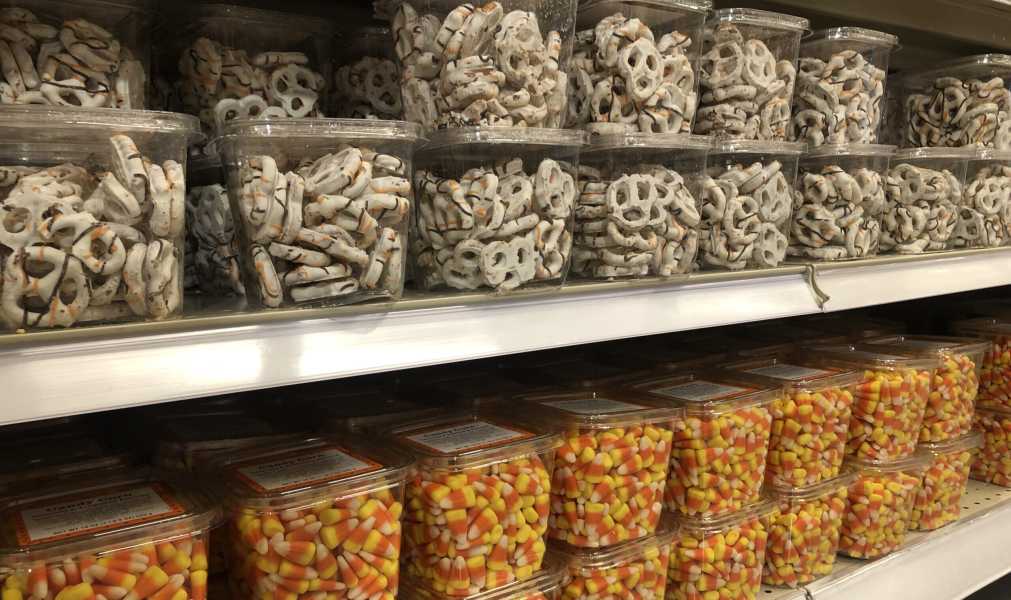Corporate America is at war with tradition and time itself.

Credit: Lindsey Nicholson/UCG/Universal Images Group via Getty Images
A week or two ago, I saw something ominous at the grocery store.
As I walked from the frozen food section, past the pharmacy, and towards the butter-and-cheese alcove, I spotted a cardboard display that looked to be filled with snack-sized candy of some sort. My eyes fixed on the unmistakable orange packaging with purple trim. Could it be? Reese’s peanut butter cup pumpkins? No, it couldn’t be—not in mid-July. Not when the weather still approaches 90 degrees on most days. Not when lawns are still being mowed. Not when barbeques are still being fired up.
Halloween is more than three months away, I kept reassuring myself.
But, as I drew closer to the display, I found that my eyes had not been deceiving me. There they were: dozens of individually wrapped peanut butter cups that had been stamped in the vague shape of a stout gourd.
Like Election Day, Halloween has apparently turned into a kind of ill-defined ongoing season. And, as far as I’m concerned, buying Reese’s pumpkins in July is akin to early voting. Indignantly, I threw a couple into my cart.
To be clear, candy makers have every right to capitalize to the fullest extent possible on the American obsession with Halloween, which has arguably become the national festival most synonymous with the consumption of candy. In fact, as it turned out, the Reese’s pumpkins were not even the only Halloween-themed candy that had been put, by my lights, prematurely on display at this particular grocery store. A few days later, I walked past a huge table overflowing with bags of candy corn and similar sugar-and-corn-syrup-derived confections.
Maybe this is old news to you. I am not naïve. Like the rest of us, I have grown accustomed to the present arrangement in which retailers seek to sell holiday- (or “holiday”-) related foods and goods further and further ahead of a given holiday. It no longer fazes me to see Halloween candy stocked at the start of the school year, even though, when I was in school, Halloween was not something that was even contemplated until the end of the September.
Yet there was something unnerving—something cynical—about the choice to make available those Reese’s pumpkins just a few weeks after the Fourth of July. The early placement of the pumpkin peanut butter cups worked to strip them of their raison d’etre. They were no longer something consumers were trained to wait for but instead just another “choice” consumers could avail themselves of.
I found the implications startling. By this logic, why should grocery stores not be free to stock all Reese’s holiday shapes and varieties simultaneously throughout the year? Under such a scheme, one could choose from among Reese’s pumpkins, Christmas trees, and Easter eggs at any time, or, at least, at times that seemed far removed from their proper seasonal context.
In fact, this would be in keeping with general trends in the sale of ostensibly season-specific goods. Once, so-called “Christmas in July” sales were conducted with a certain sense of cheeky fun; stores knew it was faintly ridiculous for consumers to stock up on Christmas trinkets amid their summer vacations. But when department stores start assembling their actual Christmas displays sometime in September—as I have personally seen some stores do in recent years—they do so not with a self-conscious sense of their own untimeliness but with an actual commitment to selling this stuff up to the 25th of December.
Subscribe Today Get daily emails in your inbox Email Address:
Yet, as I think about it, perhaps it is a good thing that retailers no longer make a minimal, semi-sincere effort to put their wares on sale at the appropriate time of the year. This enables us to more clearly see that when we consume Reese’s pumpkins or purchase cheap Christmas ornaments made overseas we are not “celebrating” anything at all. We are merely participating in the free market. If it is weird to buy this junk in July, is it really any better to purchase it during its intended season?
Ironically, merchants’ attempts to stretch out the seasons of Halloween or Christmas are always oriented in one direction: earlier. As we all know, when those days have passed, the foods and goods associated with them are usually cleared out of stores with great haste. I have long felt there are few sights sadder than the grocery store candy aisle on the day after Christmas: a heap of picked-over confections, many marked with discount labels in an attempt to clear the remnant for the Valentine’s Day treats that are sure to be on display on or around New Year’s.
This, too, is a useful if depressing reminder of the mercilessness of the economy in which our cultural traditions have become bound up: We may wish to hang onto a particular holiday or season for sentimental reasons, but for retailers, the goal is forever to advance to the next holiday or season—even if it is many, many, many months away.
Sourse: theamericanconservative.com






